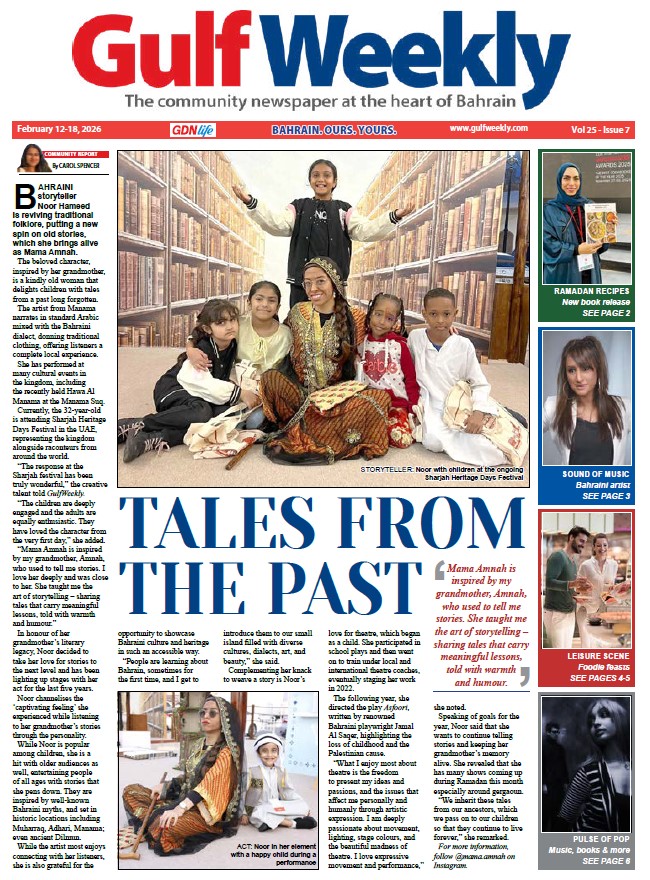Social distancing guidelines during the pandemic may be encouraging residents to keep their distance, but Bahrain’s space scientists are looking far beyond to secure our future.
Space researchers like space data analyst Shaima Shawwqi Almeer, and her peers at the National Space Science Agency (NSSA), have been developing their diverse skillsets and utilising space technologies to solve new problems more evident during the current pandemic.
Shaima told GulfWeekly: “The pandemic has actually given us more time and situations to continue our research. As part of the course I completed at the University of Twente, Netherlands, I worked on producing an atlas that highlights the current pandemic (COVID-19) situation in the GCC countries. The atlas includes visualisation of the coronavirus statistics within the region. The reason I chose this region was to showcase the capabilities and the readiness of our governments to face this challenge, and highlight that the recovery rate in Bahrain was the second highest in the world.”
Shaima, along with a team of analysts and researchers, including Ebrahim Alburshaid, Muneera Almalki and Aysha Alhajeri, has also been busy putting Bahrain’s seedling space programme on the map, winning third place globally in the American NASA Space Apps Covid-19 challenge and participating in a range of hackathons.
Shaima told GulfWeekly: “COFEED-19 was a project that was initiated during the NASA Space Apps Challenge Hackathon, COVID-19 edition. Proudly, the NSSA lab team, won the third place of the hackathon.
“We had an interesting problem. Border closures, quarantines, supply chain and trade disruptions are limiting the worlds’ access to sufficient nutritious sources of food, due to the challenges faced by logistics, according to the Food and Agriculture Organisation of the United Nations. Therefore, alarming food insecurity is on the horizon unless measures are taken to keep the food supply chain alive.
“Our solution was COFEED19, a software which aids in analysing satellite images via remote sensing technologies, leading to a secure food supply at a global scale. It theoretically analyses the environment to predict food shortages, develops a plan for sustainable food resources by detecting agriculture land use and land cover and based on the water supply chain, provides insight on the food that can be produced per unit of water.”
Pivoting from robotics, where she built an Artificial Intelligence-powered customer service robot, to space research, Shaima has been putting her multidisciplinary bachelor’s degree in Information and Communication Technology from Bahrain Polytechnic, with double majors in Network Engineering and Management Information Systems to work and supplementing it with a recently completed exclusive international course which specialises in measuring quality of data, space images and models for processing by using relevant state-of-the-art technologies.
More recently, the 24-year-old, who is proud to be ‘Bahrain’s first robotics programmer’ was part of the team that won first place in the Bahraini Women Hackathon organised by the Supreme Council for Women, under the patronage of her Royal Highness Princess Sabeeka bint Ibrahim Al-Khalifa; president of the Supreme Council for Women. Her team included Aysha Alhajeri, Sughra Hassan, Eman Al Qubaiti and Eman Almeshaal.
The team designed an application that detects, monitors and predicts oil spills via satellites and spatial operational modelling software, in order to mitigate the environmental and economic risk to human society, marine habitats, fish production, tourism sector, and the kingdom’s economy.
Shaima added: “As an outcome of the project, the team will present beneficial data to the corresponding parties. Additionally, the proposed solution aims to fulfil Bahrain’s 2030 vision and also achieve our sustainable development goals and principles.
“With the support provided by the management of the National Space Science Agency, the laboratory members are currently working on the implementation of the oil spill project.”
If you would like to get involved with NSSA’s community outreach programmes, contribute towards the programme or learn more about space, visit nssa.gov.bh or follow them on Instagram: nssa_bh










